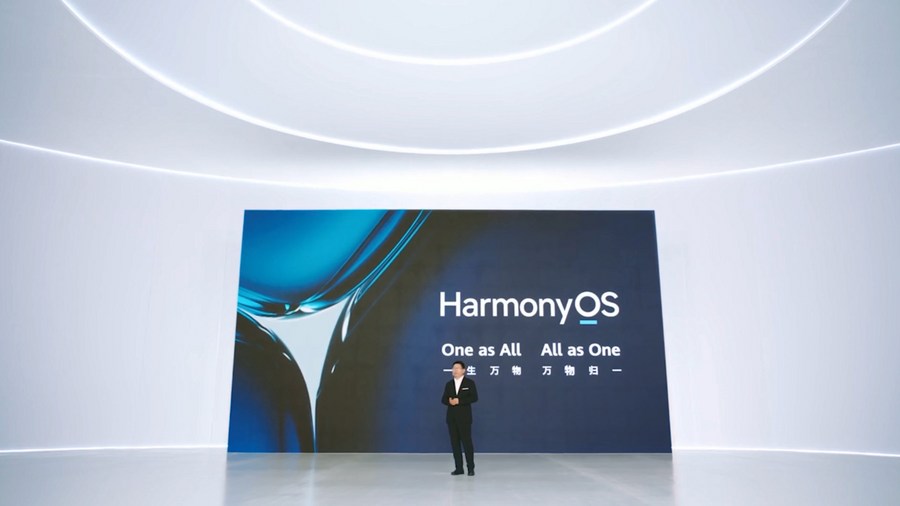
Screenshot taken on June 2, 2021 shows the online launch ceremony of Huawei's operating system HarmonyOS 2 for smartphones in Shenzhen, south China's Guangdong Province. (Xinhua/Li Sijia)
-- Chinese telecom giant Huawei on Wednesday officially launched its operating system HarmonyOS 2 for smartphones.
-- As a next-generation operating system for smart devices, HarmonyOS provides a common language for different kinds of devices to connect and collaborate, providing users with a more convenient, smooth, and secure experience.
-- Huawei expects the number of devices equipped with HarmonyOS to reach 300 million by the end of 2021.
SHENZHEN, June 2 -- Chinese telecom giant Huawei on Wednesday officially launched its operating system HarmonyOS 2 for smartphones, providing customers worldwide with a competitive alternative that works on a diverse range of devices.
HarmonyOS, or Hongmeng in Chinese, is an open-source operating system designed for various devices and scenarios. It first launched on Internet-of-Things (IoT) devices, including wearables and tablets, in August 2019.
Huawei expects the number of devices equipped with HarmonyOS to reach 300 million by the end of 2021, including more than 200 million for Huawei devices.
"We are surrounded by more and more smart devices these days, and are now in a world where all things are connected," said Richard Yu, CEO of Huawei's Consumer Business Group. "Every single one of us is a part of this fully connected world, as is every device."
"We look forward to working with more partners and developers to build a thriving HarmonyOS ecosystem," he said.
As a next-generation operating system for smart devices, HarmonyOS provides a common language for different kinds of devices to connect and collaborate, providing users with a more convenient, smooth, and secure experience, according to Huawei.
Analysts believe that the new operating system, featuring adaptability and openness, will give an impetus to the global smart-device market and offer billions of mobile terminal users worldwide more diversified choices.
The operating system launches at a time when the United States continues to restrict Huawei from accessing key American technologies and products in an attempt to lock the company out of the global 5G market.
In the first quarter of 2021, Huawei recorded a sales revenue of 152.2 billion yuan (about 23.8 billion U.S. dollars), down by 16.5 percent year on year. A U.S. crackdown against the company was widely blamed for the decline.
Zhao Xiaogang, an associate professor with the school of computer science at Wuhan University, called HarmonyOS a "mega-terminal" that enables more streamlined and efficient cross-device connectivity.
"HarmonyOS greatly enhances the interactive speed between devices and improves the efficiency of their computing power, thus providing customers with a more optimized cross-device user experience," said Zhao. He has been tracking the development of the operating system for years.













